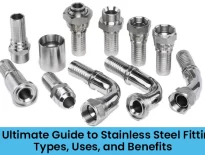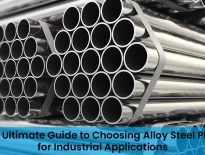Heat exchangers are essential tools in many industries. They help transfer heat between liquids for heating, cooling, or energy control. U-tube heat exchangers are a popular choice for tough industrial jobs because they are flexible and work well. This guide will explain why U-tube heat exchangers are important, how they are designed, and how they are used. We’ll also compare them to other types of heat exchangers
Understanding U-Tube Heat Exchangers
A U-tube heat exchanger is a type of shell and tube heat exchanger where the tubes are bent into a U-shape. This design allows for thermal expansion and contraction without causing stress on the tube sheets, making it particularly suited for systems with significant temperature variations. The curved design ensures durability and long-term performance.
The tube exchanger design enables heat transfer between two fluids without mixing them. One fluid flows through the U-shaped tubes, while the other flows around the tubes within the shell. The tubes are separated by the tube walls, ensuring efficient and safe heat exchange.
Key Features of U-Tube Heat Exchangers
- Thermal Expansion Capability: The U-shaped design allows the tubes to expand and contract freely, making it ideal for high-temperature applications.
- Compact Design: U-tube heat exchangers are compact yet offer a large surface area for heat transfer, ensuring high efficiency.
- Ease of Maintenance: Individual tubes can be replaced or cleaned without dismantling the entire heat exchanger, reducing downtime.
- Material Versatility: U-tube exchangers can be made from various materials, such as stainless steel, titanium, and copper alloys, to meet specific requirements.
Applications of U-Tube Heat Exchangers
U-tube heat exchangers are widely used in various heat exchanger applications due to their versatility and efficiency. Some common applications include:
- Power Plants: For heating or cooling fluids in energy generation systems.
- Oil and Gas Industry: Used for preheating crude oil or cooling refinery products.
- Chemical Processing: Facilitates efficient heat transfer in chemical reactions and processes.
- HVAC Systems: Ensures efficient cooling or heating in large-scale HVAC systems.
- Food and Beverage Industry: Used for pasteurization, heating, or cooling processes.
Comparison with Other Tube Heat Exchangers
While U-tube heat exchangers offer unique advantages, it is essential to compare them with other types, such as tube in tube heat exchangers and straight tube heat exchangers:
- Tube in Tube Heat Exchangers: These consist of one tube inside another, allowing fluids to flow in opposite directions. They are simpler in design but less compact compared to U-tube exchangers.
- Straight Tube Heat Exchangers: These are easier to clean but lack the flexibility to handle thermal expansion as effectively as U-tube exchangers.
- Tube Type Heat Exchangers: A broader category that includes U-tube, straight tube, and other designs. U-tube exchangers often stand out for applications with significant temperature variations.
Advantages of U-Tube Heat Exchangers
- Cost-Effective: The design minimizes material usage while ensuring high performance, making it cost-effective for industrial applications.
- Durability: The ability to withstand thermal expansion enhances the lifespan of the heat exchanger.
- Customizability: U-tube exchangers can be tailored to specific dimensions, materials, and configurations to meet diverse needs.
- Versatility: Suitable for a wide range of industries and fluids, including corrosive or high-temperature substances.
Heat Exchanger Tube Materials
The choice of heat exchanger tube material plays a critical role in its performance and longevity. Common materials used include:
- Stainless Steel: Resistant to corrosion and suitable for high-temperature applications.
- Titanium: Ideal for handling seawater and other corrosive fluids.
- Copper Alloys: Excellent thermal conductivity and corrosion resistance.
- Carbon Steel: Cost-effective for general-purpose applications.
Why Choose U-Tube Heat Exchangers?
The design and functionality of U-tube heat exchangers make them a preferred choice for industries requiring efficient and reliable heat transfer. They offer:
- Superior Performance: High heat transfer efficiency ensures optimal energy usage.
- Reduced Maintenance: Easy access to tubes minimizes downtime and maintenance costs.
- Versatility in Applications: From power plants to food processing, U-tube exchangers meet diverse industrial needs.
- Enhanced Durability: The ability to handle thermal stress ensures long-term reliability.
Conclusion
U-tube heat exchangers are undeniably vital for a wide range of heat exchanger applications. Their unique design, adaptability, and efficiency make them indispensable in industries requiring effective heat transfer solutions. Whether you’re considering a tube heat exchanger, tube in tube heat exchanger, or other tube type heat exchanger, U-tube exchangers stand out for their unmatched performance and versatility.
For reliable, high-quality U-tube heat exchangers tailored to your specific requirements, contact trusted manufacturers and suppliers who specialize in delivering exceptional solutions for your industrial needs.
At Solitaire Overseas, we specialize in delivering high-quality U-tube heat exchangers that meet your specific industrial needs. Our heat exchangers are designed to provide efficient and reliable heat transfer solutions, ensuring optimal performance and longevity.


